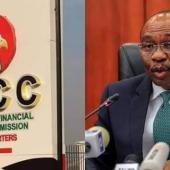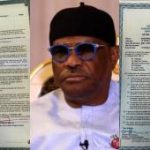The Special Offences Court sitting in Ikeja, Lagos State set January 7, 2025, to decide on the objection raised by Emefiele, over the $4.5billion and N2.8billion fraud charges against him.
The Economic and Financial Crimes Commission (EFCC) has requested Justice Rahman Oshodi of the Lagos State Special Offences Court to strike out an application filed by former Governor of the Central Bank of Nigeria (CBN), Godwin Emefiele, challenging the court’s jurisdiction.
The Special Offences Court sitting in Ikeja, Lagos State set January 7, 2025, to decide on the objection raised by Emefiele, over the $4.5billion and N2.8billion fraud charges against him.
Through its counsel, Rotimi Oyedepo, SAN, the EFCC described the application as “a ploy to frustrate the prosecution from conducting its constitutional mandate, which includes diligent prosecution of economic and financial crimes.”
Oyedepo argued that the state high court has “unfettered jurisdiction” to hear and determine the case, contrary to the claims of Emefiele’s lawyer, Olalekan Ojo, SAN, who maintained that the court lacks jurisdiction.
In his application, Ojo contended that Emefiele could not be tried in any state high court for alleged abuse of office, as it raises significant constitutional and legal issues.
He further argued that counts one to four of the 26-count charges against Emefiele “are unconstitutional” as they are not based on existing Nigerian laws.
Ojo urged the court to strike out the charges for lack of jurisdiction, stating that the offence of abuse of office related to Emefiele’s former position as CBN Governor cannot be tried in a state high court.
In response, Oyedepo insisted that the alleged crimes are economic and financial offences under the EFCC’s mandate and that Lagos State is the proper venue for the trial, as all elements of the alleged crimes occurred there.
Justice Oshodi has scheduled January 7, 2025, for a ruling on the jurisdiction challenge.
Emefiele and his co-defendant, Herry Omoile, pleaded not guilty to charges of accepting gratification, corruption, and fraudulent property receipts.
The EFCC accused them of violating the Corrupt Practices Act 2000 by conferring corrupt advantages on associates.
Follow the Sahara Reporters channel on WhatsApp: https://whatsapp.com/channel/0029VaFClvtH5JM6SSsP7M2Y





GIPHY App Key not set. Please check settings